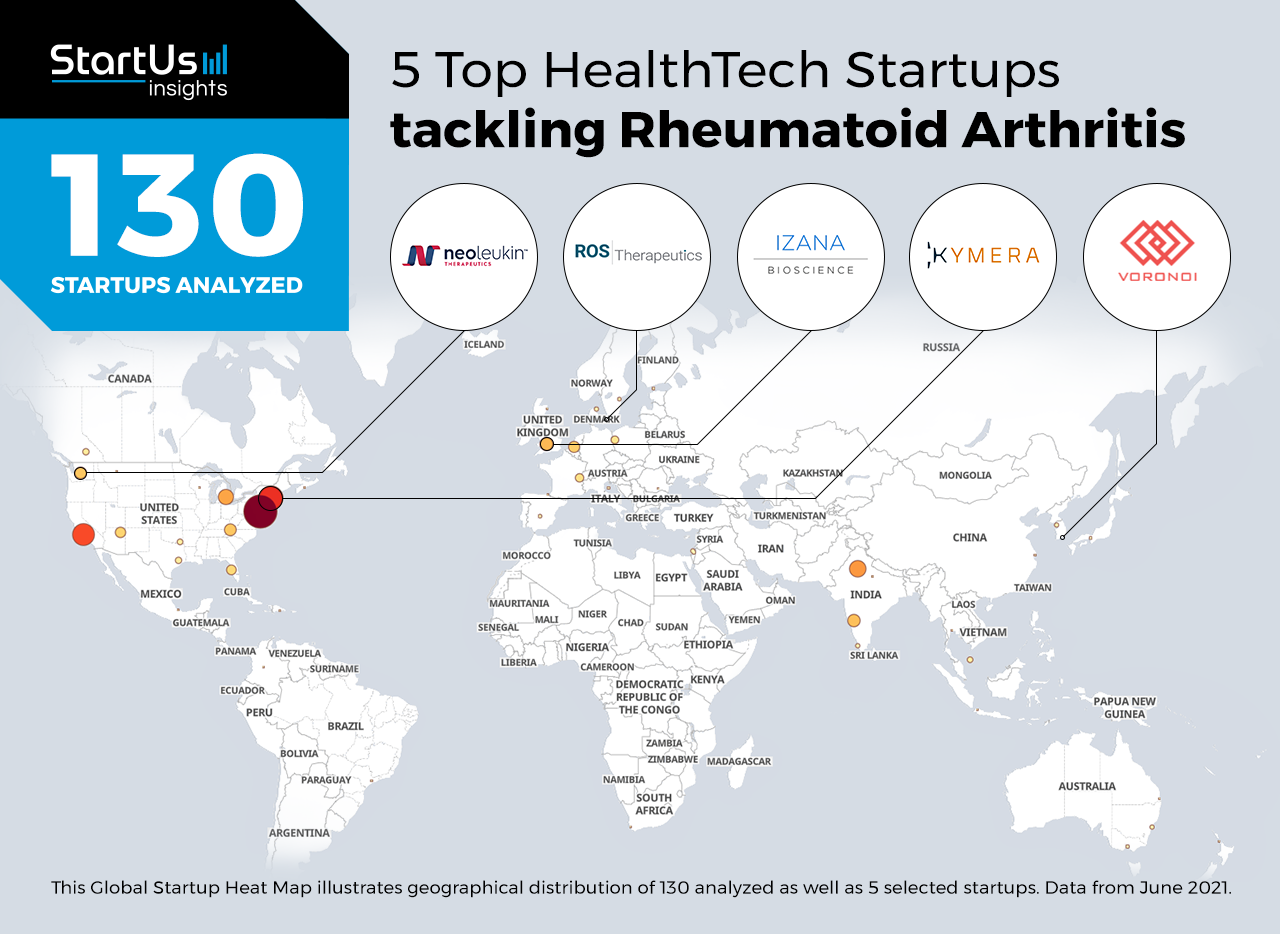Staying ahead of the technology curve means strengthening your competitive advantage. That is why we give you data-driven innovation insights into the pharma industry. This time, you get to discover 5 hand-picked startups tackling rheumatoid arthritis.
Global Startup Heat Map highlights 5 Top Startups tackling Rheumatoid Arthritis out of 130
The insights of this data-driven analysis are derived from the Big Data & Artificial Intelligence-powered StartUs Insights Discovery Platform, covering 2.093.000+ startups & scaleups globally. The platform gives you an exhaustive overview of emerging technologies & relevant startups within a specific field in just a few clicks.
The Global Startup Heat Map below reveals the distribution of the 130 exemplary startups & scaleups we analyzed for this research. Further, it highlights 5 healthcare & pharma startups that we hand-picked based on criteria such as founding year, location, funding raised, and more. You get to explore the solutions of these 5 startups & scaleups in this report. For insights on the other 125 solutions tackling rheumatoid arthritis, get in touch.
Voronoi identifies Small Molecule Inhibitors
Rheumatoid arthritis is marked by severe inflammation of the joints. Kinase signaling pathways promote pro-inflammatory cytokine gene expression, leading to inflammation. However, many small molecule inhibitors are known to block kinase signaling pathways involved in inflammation. This is why pharma startups are developing small molecule drugs for RA as well as other inflammatory conditions.
South Korean scaleup Voronoi discovers small molecule inhibitor drugs. The VORONOMICS platform utilizes in-silico modeling and X-ray crystallography to identify compounds with high selectivity towards kinases. It uses the startup’s proprietary database and a predictive tool to design small molecule drugs that inhibit the action of kinases. In addition to rheumatoid arthritis, Voronoi’s pipeline includes drugs targeting glioblastoma, psoriasis, and atopic dermatitis, among other conditions.
Izana develops Monoclonal Antibodies (mAbs)
Monoclonal antibodies find use in the treatment of immune-mediated inflammatory diseases. For the treatment of RA, pharma startups are developing mAbs that target cytokines that mediate the development of rheumatoid arthritis. By blocking the action of cytokines, therapeutic antibodies influence downstream signaling pathways, reversing the disease state.
Izana Bioscience is a British startup developing a monoclonal antibody for rheumatoid arthritis. Namilumanb (IZN-101), the startup’s lead mAb, targets granulocyte macrophage-colony stimulating factor (GM-CSF). By blocking the action of GM-CSF, the mAb reduces inflammation. The startup is also investigating IZN-1O1 for the treatment of ankylosing spondylitis (AS) and COVID-19.
Neoleukin Therapeutics creates Protein-based Therapeutics
Going beyond antibodies, other protein-based therapeutics are also gaining traction for the treatment of RA and other inflammatory conditions. Unlike small molecule drugs, these are highly specific and enable a complex set of functions. They act by a wide range of mechanisms, including augmenting levels of beneficial proteins and blocking the binding of cytokines to receptors. This is why pharma startups are working on protein-based therapeutics to treat RA.
US-based startup Neoleukin Therapeutics creates immunotherapies using de novo protein design. The startup’s proprietary platform uses computational approaches to design highly selective and hyper-stable proteins. It leverages the platform to develop cytokine mimetics that restore cytokine receptor signaling. This alleviates conditions caused by dysregulated cytokine receptor signaling, such as RA, inflammatory bowel disease (IBD), and multiple sclerosis.
ROS Therapeutics offers Methotrexate (MTX) Therapy
Methotrexate is an effective drug for rheumatoid arthritis and is often used as the first-line therapy in its treatment. However, since it was originally developed as a chemotherapy drug, it exhibits side effects such as hair loss, nausea, and skin pigmentation. This limits its use in certain subgroups of patients, particularly children. To address this, pharma startups are developing novel MTX-based therapies and treatment regimens.
Danish startup ROS Therapeutics addresses the unmet clinical needs of juvenile idiopathic arthritis (JIA) and other chronic inflammatory conditions in children. It develops Trexior, an orally administered methotrexate therapy. The prodrug is inactive but releases active agent on exposure to reactive oxygen species (ROS). This reduces the toxicity of MTX, enabling the administration of higher doses for more effective treatment.
Kymera Therapeutics utilizes Targeted Protein Degradation (TDP)
Many diseases, including RA and other inflammatory conditions, are marked by abnormal levels of certain proteins. TDP represents an emerging therapeutic approach to tackle this by leveraging the ubiquitin-proteasome system (UPS) that degrades unwanted proteins in cells. Pharma startups are leveraging its mode of action to selectively degrade disease-causing proteins.
US-based startup Kymera Therapeutics uses targeted protein degradation to develop novel small molecule therapeutics. The startup’s Pegasus platform leverages rational design to identify protein-degrading molecules for unmet clinical needs. It combines knowledge of the UPS with computational approaches to drive drug discovery. The startup’s lead drug candidate targets the IRAK4 pathway implicated in RA, atopic dermatitis, and hidradenitis.
Discover more Pharma Startups
Pharma startups such as the examples highlighted in this report focus on artificial intelligence, precision medicine, digital therapeutics as well as additive manufacturing. While all of these technologies play a major role in advancing the pharma industry, they only represent the tip of the iceberg. To explore more pharma technologies, simply get in touch to let us look into your areas of interest. For a more general overview, you can download our free Pharma Innovation Report to save your time and improve strategic decision-making.









